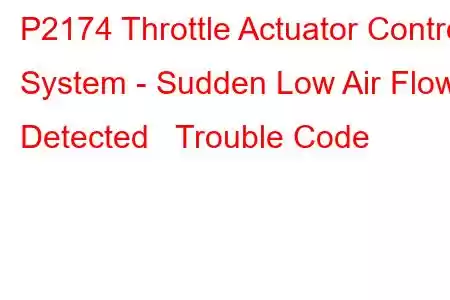P2174 Throttle Actuator Control System - Sudden Low Air Flow Detected
OBD-II Trouble Code Technical Description
Throttle Actuator Control System - Sudden Low Air Flow Detected
What does that mean?
This generic powertrain diagnostic trouble code (DTC) typically applies to all OBD-II equipped vehicles that use a drive-by-wire throttle control system including but not limited to vehicles from Dodge, Ram, Chrysler, Jeep, Porsche, etc.
The P2174 OBD-II trouble code is one of number of possible codes that indicates that the Powertrain Control Module (PCM) has detected a malfunction in the operation of the Throttle Actuator Control System.
The PCM sets these when other codes are present that indicate an issue that may be safety related or cause damage to the engine or drivetrain components if not corrected in a timely manner. This and related codes (P2172, P2173, P2174, and P2175) all indicate detected air flow problems.
Code P2174 is set by the PCM when low air flow is suddenly detected in the throttle actuator control system.
This code can be related to a Throttle Actuator Control System malfunction, but it is possible that another issue is setting this code. The Throttle Actuator Control System is duty cycle controlled by the PCM and the function of the system is limited when other fault codes are detected.
Code Severity & Symptoms
The severity of this code can be moderate to severe based on the specific malfunction. Symptoms of a P2174 trouble code may include:
Malfunction Indicator Lamp (MIL) or ABS warning lamp illumination Engine may not start Either no or low throttle response Automatic transmission will not shift Additional codes are possibly setCommon Causes Of This DTC Code
Potential causes of the P2174 throttle engine code may include:
Engine Overheating Manifold Absolute Pressure Malfunction Abnormal System VoltagesP2174 Diagnostic and Repair Procedures
The first step in the troubleshooting process for any malfunction is to research the Technical Service Bulletins (TSB's) for the specific vehicle by year, model and power plant. In some circumstances this can save a lot of time in the long run by pointing you in the right direction.
The second step for this code is to complete a PCM scan to identify other trouble codes. This code is an informational code and in most circumstances this code's function is to alert a driver that the PCM has initiated a fail-safe mode because of a malfunction or failure in a system that is not directly related to the Throttle Control Actuator.
If other codes are identified you should check for TSB's related to the specific vehicle and that code. If a TSB has not been generated you should follow the specific troubleshooting steps for that code to pinpoint the source of the malfunction that the PCM is detecting to put the engine in fail-safe or limp mode.
Once all other codes have been cleared or if no other codes are detected, if the Throttle Control Actuator code still exists the PCM and Throttle Control Actuator should be evaluated. All wiring and connections should be visually inspected for obvious defects as a starting point.
Common Mistake
Replacing the Throttle Control Actuator or PCM when other malfunctions are setting this code.
Rare Repair
Replace Throttle Actuator Control
Hopefully, the information in this article has been helpful to point you in the right direction to correct the problem with your Throttle Actuator Control System force code. This article is strictly informational and the specific technical data and service bulletins for your vehicle should always take priority.
Read: 27


